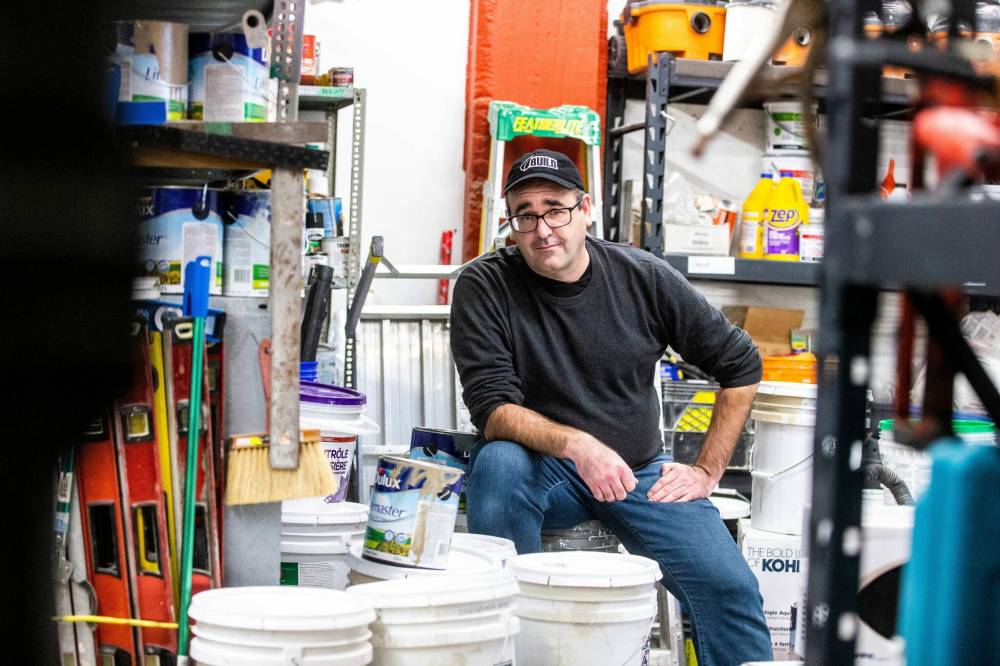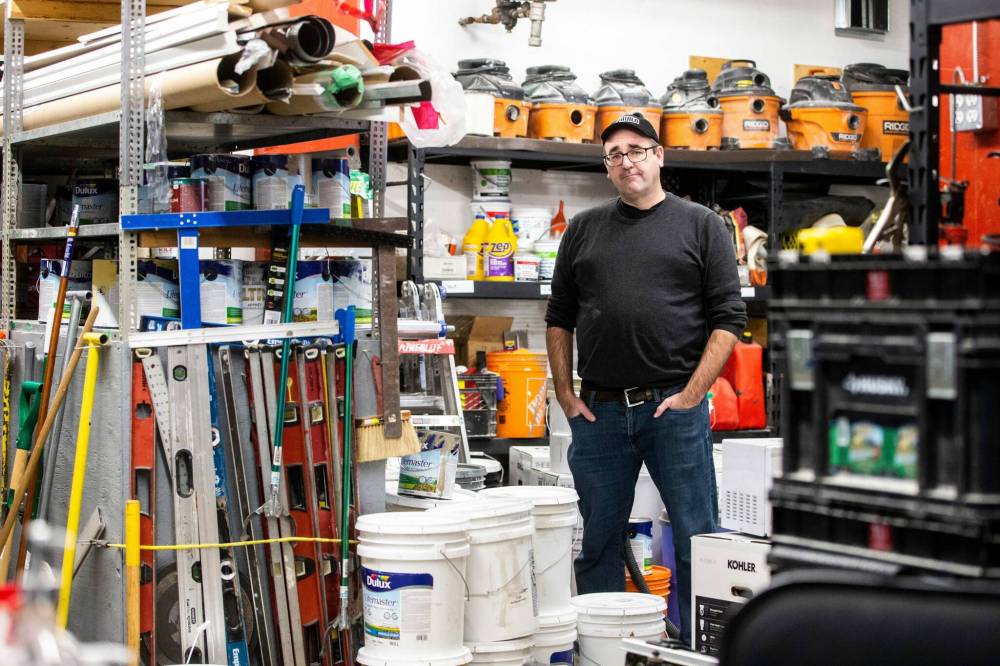Province cuts funding for BUILD program
Hundreds of potential trainees on wait list lose out on chance to learn a trade, turn lives around
Advertisement
Read this article for free:
or
Already have an account? Log in here »
To continue reading, please subscribe:
Monthly Digital Subscription
$0 for the first 4 weeks*
- Enjoy unlimited reading on winnipegfreepress.com
- Read the E-Edition, our digital replica newspaper
- Access News Break, our award-winning app
- Play interactive puzzles
*No charge for 4 weeks then price increases to the regular rate of $19.00 plus GST every four weeks. Offer available to new and qualified returning subscribers only. Cancel any time.
Monthly Digital Subscription
$4.75/week*
- Enjoy unlimited reading on winnipegfreepress.com
- Read the E-Edition, our digital replica newspaper
- Access News Break, our award-winning app
- Play interactive puzzles
*Billed as $19 plus GST every four weeks. Cancel any time.
To continue reading, please subscribe:
Add Free Press access to your Brandon Sun subscription for only an additional
$1 for the first 4 weeks*
*Your next subscription payment will increase by $1.00 and you will be charged $16.99 plus GST for four weeks. After four weeks, your payment will increase to $23.99 plus GST every four weeks.
Read unlimited articles for free today:
or
Already have an account? Log in here »
Hey there, time traveller!
This article was published 21/12/2022 (1081 days ago), so information in it may no longer be current.
Daniel Peterson went from meth addict and convict to busy carpenter, in part, because of an Indigenous-led social program teaching trades skills to Manitobans who face employment barriers.
Building Urban Industries for Local Development — or BUILD — has worked with more than 1,000 people over 16 years, funnelling them into roles repairing Manitoba Housing and other low-income housing units.
BUILD’s training program shutters next Tuesday. It can’t get consistent funding.

MIKAELA MACKENZIE / WINNIPEG FREE PRESS
Sean Hogan, executive director of BUILD, says about 300 people are on the waiting list for the soon-to-close training centre.
“I feel like we’ve been standing on the corner with a bouquet of roses for a long time,” said Sean Hogan, BUILD’s executive director. “Nobody’s coming.”
Roughly 300 people are on a waitlist for BUILD’s training, Hogan said. They have backgrounds with Child and Family Services, prison, gangs and Employment Insurance.
Many haven’t finished high school, Hogan added.
“Before they get to us, they would not be competitive on the job market,” he said. “Once they leave us, they actually have a good fighting chance.”
Peterson arrived in 2016. He was on parole; he’d finished six years in prison, he said.
“I was just looking to better my life and give it 100 per cent,” Peterson, now 43, said.
He spent two months in BUILD’s classes, which meant math in the mornings and painting, drywalling and power tool training in the afternoons.
Drug addiction and jail stints broke up Peterson’s training. Still, he returned to BUILD, completing the necessary four months of on-the-job training.
“I appreciated the chance,” Peterson said, adding the program has since “opened a lot of doors.”
He’s been a roofer and now works for BUILD. The social enterprise tackles insulation, water retrofits and interior renovations. It’s renovated more than 200 low-income rental units this year, according to a BUILD news release.
“If these guys weren’t here, I’d either be dead or living in a tent,” Peterson noted. “I’ve been pretty indifferent my whole life, but I… know that (BUILD) helped me, and if the program was taken away… that’s a pretty big loss.
“After a day of work, I feel fulfilled.”
BUILD’s contract with the provincial government began in 2006 and ended about four years ago, Hogan said.
During that time, the organization would get around $800,000 per year of provincial dollars, he said. Though the funding dried up, BUILD received a multi-year fund from Ottawa, bringing in roughly $1 million annually, Hogan said.
“Two years ago is when things really started to go sideways,” Hogan said.
It’s when the federal government’s contributions ended. BUILD had been negotiating with the province for a new contract — something that continued until two weeks ago, Hogan said.
“We’ve been spinning our tires,” he added.
In early talks, the province was considering financing BUILD if it stopped paying its trainees, Hogan said. BUILD pays its trainees minimum wage.
A provincial spokesperson did not answer if Manitoba asked BUILD to stop paying trainees. They also did not answer how long they’d been in negotiations with BUILD, or how much funding they’d provided before this year.
BUILD was sent to the province’s social innovation office, where it spent two years working on a social impact bond, Hogan said.
A couple weeks ago, the province called BUILD saying they “wouldn’t move forward” with funding, Hogan said.

MIKAELA MACKENZIE / WINNIPEG FREE PRESS
Sean Hogan said the provincial government said it would fund BUILD if it stopped paying trainees. The provincial government would not comment.
“It is really discouraging,” he added.
BUILD needs $1 million annually to operate its training program, Hogan said. Pre-2020, it trained between 50 and 100 people. The staff level is currently 35 employees — most of whom are former BUILD trainees — but layoffs could be coming, Hogan said.
Since both government contracts ended, BUILD has trained some Manitobans using bridge grants and money the social enterprise has made through its renovation work.
“We can’t afford to pay for this,” Hogan said.
The province gave BUILD a $485,000 bridge grant last April and renewed its agreement for BUILD to be a Manitoba Housing contractor, a provincial spokesperson wrote in a statement.
BUILD is “welcome to apply” to a provincial request for proposal for post-bail job-training contractors, for up to $2 million, that was announced on Halloween, the spokesperson wrote.
The province will issue the request for proposal in 2023, according to the spokesperson.
BUILD will continue to renovate low-income housing, Hogan said. It’s conducted water retrofits on more than 7,000 Manitoba Housing and low income housing units. In the past, it’s worked with Efficiency Manitoba and Manitoba Hydro.
The social enterprise’s main business is interior renovations like patching, painting and flooring, Hogan said.
“It would warm Ebenezer Scrooge’s heart to see what this government is doing,” Manitoba Liberal Leader Dougald Lamont said, adding “we have worker shortages.”
Manitoba will need to recruit 4,800 construction workers by 2027, according to BuildForce Canada data. The Manitoba Construction Sector Council estimates 4,500 Manitoban construction workers — 11 per cent of the industry — will retire within five years.
Lamont pointed to the $577 million increase in equalization payments Manitoba is getting from Ottawa next year.
“That’s enough to run many, many BUILDs,” Lamont said. “That money… is supposed to be spent on programs and services. It’s not supposed to be used to just cut the taxes of the wealthiest Manitobans.”
Lisa Naylor, the NDP’s critic for climate change, called the end of BUILD’s training program “devastating for the community.”
“This is a harmful decision by the province,” she said.
BUILD was part of a City of Winnipeg advisory group on social procurement. Council approved a sustainable procurement action plan, to be rolled out over three years, in July.
The plan’s goals include increasing employment of equity groups and inking more contracts with social enterprises, and Indigenous and diverse businesses.
gabrielle.piche@winnipegfreepress.com

Gabby is a big fan of people, writing and learning. She graduated from Red River College’s Creative Communications program in the spring of 2020.
Our newsroom depends on a growing audience of readers to power our journalism. If you are not a paid reader, please consider becoming a subscriber.
Our newsroom depends on its audience of readers to power our journalism. Thank you for your support.
History
Updated on Thursday, December 22, 2022 9:35 AM CST: Adds that province will issue the request for proposal in 2023

